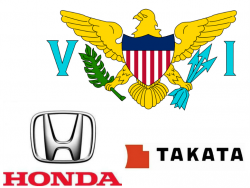
— The U.S. Virgin Islands has filed a lawsuit against Takata and Honda alleging the companies manufactured, used and marketed defective airbags the companies knew were prone to explode, causing injuries and deaths. The lawsuit says Honda and Takata misled Virgin Island consumers about the safety of the vehicles and the airbags.
Hawaii got the ball rolling when it announced a government lawsuit against Takata and automaker Honda, the company that previously used Takata airbags more than any other automaker. Honda was pulled through the mud by Takata's deception and all confirmed deaths except one have occurred in Honda vehicles.
Based on court documents, the attorney general is worried about recouping money from Takata because of the fear the company will go bankrupt due to the defective airbags. According to the complaint, Takata is facing recall costs of as much as $24 billion, not counting all the fraud and injury lawsuits filed against the company.
Attorney General Claude E. Walker filed the lawsuit on behalf of Virgin Island residents and the thousands of VW owners located in an area of the world known for high humidity.
The humidity is a big contributing factor as to why the airbags explode, sending shards of metal into occupants. The humidity creates moisture that can seep into the metal airbag inflators and affect the explosive ammonium nitrate inside the inflators. What should be a small explosive force to deploy the airbags becomes a massive explosion equal to a grenade exploding in a car.
Specifically, the lawsuit claims Takata made the sole decision to use something called "phase stabilized ammonium nitrate" as the airbag propellant. In addition to knowing the chemical is cheap to use, Takata also knew the ammonium nitrate was a completely unstable chemical easily destabilized by moisture.
Mr. Walker says because of the history of ammonium nitrate, Takata should have carefully tested the chemical but skipped the tests, sending out airbags that never passed product evaluation processes inside the company.
The Virgin Islands lawsuit alleges Takata continued its scheme for nearly 16 years, engaging in a pattern of criminal behavior and concealing the truth from the world. The deception has so far cost at least 10 people their lives in the U.S. and about 140 people have suffered injuries because Takata wanted to make money.
The attorney general says that even when Takata knew the inflators were dangerous, the company still refused to notify automakers that used the airbags. Walker says Takata had plenty of time to notify automakers and save lives, but chose to falsify data to keep the charade going.
Takata is charged with violations of the Criminally Influenced and Corrupt Organizations Act, or CICO, based on allegations that Takata concealed airbag defects through a pattern of criminal activity.




